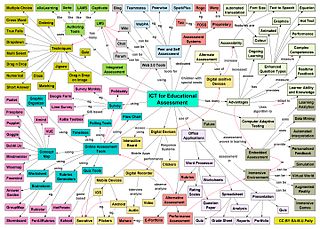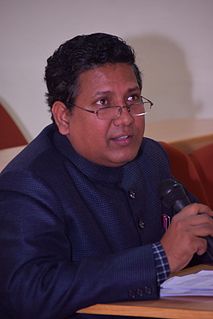Related Research Articles

Vocational education is education that prepares people to work as a technician or to take up employment in a skilled craft or trade as a tradesperson or artisan. Vocational Education can also be seen as that type of education given to an individual to prepare that individual to be gainfully employed or self employed with requisite skill. Vocational education is known by a variety of names, depending on the country concerned, including career and technical education, or acronyms such as TVET and TAFE.

Information and communications technology (ICT) is an extensional term for information technology (IT) that stresses the role of unified communications and the integration of telecommunications and computers, as well as necessary enterprise software, middleware, storage and audiovisual, that enable users to access, store, transmit, understand and manipulate information.

Education in Rwanda has undergone considerable changes throughout Rwanda's recent history, and has faced major disruptions due to periods of conflict.Education was divided by gender whereby women and men had a different education relevant to their responsibilities in day to day life. Women were mostly taught housekeeping while men were mainly taught how to hunt, rear animals, and fish. This is because Rwanda was a community based society where every member had a specific contribution to the overall development of the community.Older family members like grandparents usually took on the role of Educators.

Before the arrival of European settlers, who introduced a formal education system addressed to the elites, education in Ghana was mainly informal and based on apprenticeship. Economic activities in pre-colonial Ghana were based on farm produce shared within households and members of each household specialized in providing necessities such as cooking utilities, shelter, clothing, and furniture, and trade with other households was therefore practiced on a very small scale. As such there was no need for employment outside the household that would have otherwise called for disciplines, values, and skills through a formal education system. After colonization, Ghana's economy became a hybrid of subsistence and formal economy.
Education in Tanzania is provided by both the public and private sectors, starting with pre-primary education, followed by primary, secondary ordinary, secondary advanced, and ideally, university level education. Free and accessible education is a human right in Tanzania. The Tanzanian government began to emphasize the importance of education shortly after its independence in 1961. Curriculum is standardized by level, and it is the basis for the national examinations. Achievement levels are important, yet there are various causes of children not receiving the education that they need, including the need to help families with work, poor accessibility, and a variety of learning disabilities. While there is a lack of resources for special needs education, Tanzania has committed to inclusive education and attention on disadvantaged learners, as pointed out in the 2006 Education Sector Review AIDE-MEMORE. The government's National Strategy for Growth and Reduction of Poverty in 2005 heavily emphasized on education and literacy.
The Tanzania Commission for Science and Technology (COSTECH) is a parastatal organization affiliated with the government of Tanzania. It was created by an Act of the National Assembly of Tanzania in 1986 as a successor to the Tanzania National Scientific Research Council. The commission was a subsidiary institution to the Ministry of Communications, Science and Technology (MCST) and is now a subsidiary institution to the Ministry of Education, Science & Technology. The main offices are located in Dar es Salaam.

The education system of Djibouti is strongly influenced by France.

Science and technology is a growing field in Pakistan and has played an important role in the country's development since its founding. Pakistan has a large pool of scientists, engineers, doctors, and technicians assuming an active role in science and technology. The real growth in science in Pakistan occurred after the establishment of the Higher education Commission in 2002 which supported science in a big way and also became the major sponsor of the Pakistan Academy of Sciences under the leadership of Prof. Atta-ur-Rahman. The emphasis was placed on quality rather than numbers during this period. The quality measures introduced by Prof. Atta-ur-Rahman as Founding Chairman HEC included:1) All Ph.D. thesis were evaluated by eminent foreign scientists,2) All PhD theses and research papers were checked for plagiarism 3) Some 11,000 students were sent abroad to leading universities for PhD level training and absorbed on their return, 4) Appointments at faculty positions were linked to international stature of the applicants as judged from their international publications, patents and citations, and (5) Quality Enhancement Cells were established in all universities for the first time in the history of the country. (6) The minimum criteria for establishment of a new university were approved by the Cabinet and universities that did not meet this criteria were closed down. (7) The Model University Ordinance was approved setting the governance parameters for new universities. (8) A list of fake higher education institutions was prepared and made public. (9) Quality Assurance Agency (QAA) was set up within the Higher Education Commission that established Quality Enhancement Cells (QECs) as its operational units in public and private-sector universities across the country. (10) The funding of universities was linked to excellence in teaching and research under a formula based funding mechanism that considered enrolment, subjects and quality of teaching and research. The first IT policy and implementation strategy was approved under the leadership of Prof. Atta-ur-Rahman, then Federal Minister of Science & technology, in August 2000 which laid the foundations of the development of this sector On the request of Prof. Atta-ur-Rahman, Intel initiated a nationwide programme to train school teachers in Information and Communication technologies in March 2002 which has led to the training of 220,000 school teachers in 70 districts and cities across Pakistan. A 15-year tax holiday was approved on the recommendation of Prof. Atta-ur-Rahman which has resulted in growth of IT business from $30 million in 2001 to over $3 billion. The Pakistan Austria University of Applied Engineering (Fachhochschule) has been established in Haripur Hazara under a Steering Committee Chaired by Prof. Atta-ur-Rahman in which students will get degrees from several Austrian universities. Pakistan's growth in scientific output can be seen from the fact that in 1990 Pakistan published 926 scholarly documents while in 2018 the number rose to 20548, a twenty times increase.In contrast India published 21443 scholarly documents in 1990 and the number rose to 171356 in 2018, an eight times increase. In 2018, 336 people per million were researchers in the R&D in Pakistan compared to 256 people per million being researchers in India. The reforms begun by Prof. Atta-ur-Rahman FRS in 2003-2008 have continued over the subsequent decade and according to the Web of Science report, there was a 300% growth in research publications in 2019 over the decade, with 2019 marking the first year in which Pakistan was ranked above the world average in research. In 2019, Pakistan produced 300% more publications indexed in the Web of Science Core Collection than in 2010. In the decade of 2010-2019, more than half of Pakistan’s research was published in journals with Impact Factor. The global influence of Pakistan’s research is increasing as scientists in the country are publishing more in top quartile journals. The Category Normalized Citation Impact of Pakistan’s publications has risen from 0.67 to 1.03. output. As of 2020, Pakistan has 85% teledensity with 183 million celllular, 98 million 3G/4G and 101 million broadband subscribers, due to the foundations laid by Prof. Atta-ur-Rahman of the IT and telecom industry during 2000-2008. In an analysis of scientific research productivity of Pakistan, in comparison to Brazil, Russia, India and China, Thomson Reuters has applauded the developments that have taken place as a result of the reforms introduced by Prof. Atta-ur-Rahman FRS, since Pakistan has emerged as the country with the highest increase in the percentage of highly cited papers in comparison to the "BRIC" countries
The Ministry of Education and Vocational Training was a government body responsible for providing education in Tanzania. The head offices were located in Dar es Salaam. Under President John Magufuli's first cabinet, the ministry was amalgamated with other functions to form the new Ministry of Education, Science, Technology and Vocational Training.

K M Baharul Islam is presently the Chairperson of Centre of Excellence in Public Policy and Government at Indian Institute of Management Kashipur. He served as the Dean (Academics) during 2019-2021 at the same institute. He was elected as a Fellow of the Royal Asiatic Society of Great Britain and Ireland on 18 March 2020. In October 2021, he was invited as a Visiting Professor at the London School of Economics.

The Tanzania Communications Regulatory Authority (TCRA), established by the TCRA Act No. 12 of 2003, is an independent Authority for the postal, broadcasting and electronic communications industries in the United Republic of Tanzania. It merged the former Tanzania Communications Commission and the Tanzania Broadcasting Commission. The TCRA is accountable to the Communications and Technology Ministry. The Information Communication and Technology (ICT) sector reform in Tanzania is notable in that development was influenced by regional, political (national) and technological factors. Tanzania is one of the few African countries to liberalise the communications sector whereby the Converged Licensing Framework (CLF) is used as a key strategy, in terms of the Tanzania Communications Regulations. Since inception in 2003, the TCRA has issued a number of regulations to administer the sector, but still faces a number of challenges such as the roll-out of services to under-serviced rural areas.
Information and communication technology (ICT) in Kosovo has experienced a remarkable development since 1999. From being almost non-existent 10 years ago, Kosovar companies in the information technology (IT) domain offer today wide range of ICT services to their customers both local as well as to foreign companies. Kosovo has the youngest population in Europe, with advanced knowledge in ICT.
Science and technology is Jordan's fastest-growing economic sector. This growth is occurring across multiple industries, including information and communications technology (ICTs), solar and wind energy and nuclear technology.
The Government agencies in Bangladesh are state controlled organizations that act independently to carry out the policies of the Government of Bangladesh. The Government Ministries are relatively small and merely policy-making organizations, allowed to control agencies by policy decisions. Some of the work of the government is carried out through state enterprises or limited companies.
Science and technology in Tanzania describes developments and trends in higher education and science, technology and innovation policy and governance in the United Republic of Tanzania since the turn of the century.
Science and technology in Uganda examines government efforts to develop a national innovation system and the impact of these policies.
The Ministry of Education, Science, Technology and Vocational Training is a ministry of the Tanzanian government responsible for the provision of education, vocational training and policy on science and technology.
References
- ↑ "Our Roles, Ministry, Contact us". Archived from the original on 2009-04-30. Retrieved 2020-04-04.
- ↑ Philemon Andrew K. Mushi (2009). History and Development of Education in Tanzania. African Books Collective. p. 188. ISBN 978-9976-60-494-8.
In 2005 the Ministry [of Science, Technology and Higher Education] was changed to the Ministry of Higher Education, Science and Technology and operated up to 2008, when it was again combined with the Ministry of Education and Vocational Training.
- ↑ "Mainstreaming Higher Education in National and Regional Development in Southern Africa" (PDF). p. 13.
Until February 2008, there was a Ministry of Higher Education, Science and Technology (MHEST). In. February 2008, higher education was dissolved into the Ministry of Education and Vocational Training (MoEVT) and Science and Technology was assigned to the Ministry of Communication, Science and Technology.
- ↑ "Organization Structure, Tanzania Atomic Energy Commission" (PDF). Archived from the original (PDF) on 2016-03-03. Retrieved 2013-06-28.